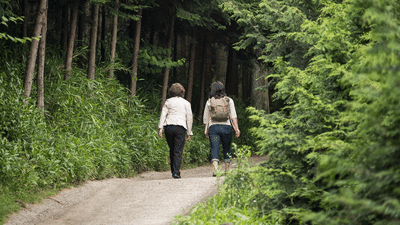In a world full of screens, deadlines, and artificial intelligence, the simple act of stepping into a forest can profoundly affect human health. Shinrin-Yoku , or " forest bathing " in English, is not just a spa fad; it is a science-based, traditional Japanese practice , evidence-backed therapy that has the power to enhance the immune system and even augment the body's own ability to fight cancer cells.
What exactly is Shinrin-Yoku
Shinrin-Yoku began in Japan in the 1980s, as a part of a national health initiative by the Japanese government, to reduce stress and re-engage humans with nature. Unlike exercise or hiking, this practice is not a strenuous activity; it is a mindful immersion, leisure walking in the woods, inhaling deeply, and noticing the little details that matter to calm the senses and get a feeling of relaxation at the psychological and physiological levels.
The science: How forest bathing boosts immunity

Current research, including the complete review published by Dr. Qing Li and coauthors in Environmental Health and Preventive Medicine, reveals measurable immune system responses with forest immersion. Most significant among them is the effect on Natural Killer (NK) cells, which are tasked with detecting and destroying aberrant or malignant cells.
Three days of forest residence were discovered to be able to raise NK cell activity by a significant percentage, according to the studies that were reviewed. Another study, which consisted of five days of travel, found a remarkable increase in the number and activity of the immune cells. These effects were not transient, enhanced NK cell activity and higher levels of anti-cancer proteins persisted for as long as 30 days after leaving the forest.
How the forest influences NK cells
The enhancement of NK cell activity is caused by phytoncides, which are natural aromatic volatile oils released by plants and trees. These organic volatile oils, intended to protect plants from insects and microbes, also boost the human immune system when they are inhaled.
Science has proven that forest atmospheres not only increase levels of Natural killer cells, but also increase levels of anti-cancer proteins such as perforin, granulysin, and granzymes, chemicals that NK cells use to identify and destroy aberrant cells. Essentially, time spent among trees gives the immune system improved tools to identify and destroy potential cancer cells before they can become a threat.
Aside from cancer prevention: The holistic health benefits

The influence of Shinrin-Yoku extends much further than immunity. A number of studies reviewed by Dr. Li show that forest bathing can:
How long do these effects lastThe stress-reducing and immune-boosting effects of a single forest visit can last for weeks. In a three-day forest immersion experiment, subjects maintained their heightened NK cell activity for more than a week following their return to urban life. For longer interventions, such as five-day or multi-week forest retreats, the effects lasted for up to 30 days.
This indicates that routine forest exposure, even a single or double monthly exposure, may maintain an enhanced immune defense year-round.
Forest bathing vs. Other wellness activitiesIn contrast to standard exercise or meditation, forest bathing alone brings together distinct physical stillness, sensory stimulation, and exposure to natural biochemicals. Phytoncides, negative ions, and microbial richness in forest air all work together to produce quantifiable physiological effects that cannot easily be imitated indoors or in city parks.
Whereas exercise builds fitness and meditation builds focus, Shinrin-Yoku covers both bases — calming the mind and rejuvenating the body simultaneously.
What the science DOES NOT claimIt must be emphasized that forest bathing is not a cancer treatment and does not kill cancer cells in the body directly. It is the increase in NK cell activity, not destroying the cancer cells. What this amounts to is that forest bathing enhances the body's own watchdog system, making its prevention and protection systems effective and not functioning as medication.
The evidence is straightforward: A walk in the woods can redefine immune health. A three-day forest retreat can increase NK cell activity by up to 80 percent, elevate levels of anti-cancer proteins, and decrease stress hormones by a significant margin, effects lasting up to weeks.
Incorporating forest bathing into your lifestyle is a cost-effective, holistic, science-supported way to improve overall well-being. You don't need a remote wilderness area to begin; any wooded, green area where you can breathe deeply, unplug, and reconnect with nature will do.
What exactly is Shinrin-Yoku
Shinrin-Yoku began in Japan in the 1980s, as a part of a national health initiative by the Japanese government, to reduce stress and re-engage humans with nature. Unlike exercise or hiking, this practice is not a strenuous activity; it is a mindful immersion, leisure walking in the woods, inhaling deeply, and noticing the little details that matter to calm the senses and get a feeling of relaxation at the psychological and physiological levels.
The science: How forest bathing boosts immunity
Current research, including the complete review published by Dr. Qing Li and coauthors in Environmental Health and Preventive Medicine, reveals measurable immune system responses with forest immersion. Most significant among them is the effect on Natural Killer (NK) cells, which are tasked with detecting and destroying aberrant or malignant cells.
Three days of forest residence were discovered to be able to raise NK cell activity by a significant percentage, according to the studies that were reviewed. Another study, which consisted of five days of travel, found a remarkable increase in the number and activity of the immune cells. These effects were not transient, enhanced NK cell activity and higher levels of anti-cancer proteins persisted for as long as 30 days after leaving the forest.
How the forest influences NK cells
The enhancement of NK cell activity is caused by phytoncides, which are natural aromatic volatile oils released by plants and trees. These organic volatile oils, intended to protect plants from insects and microbes, also boost the human immune system when they are inhaled.
Science has proven that forest atmospheres not only increase levels of Natural killer cells, but also increase levels of anti-cancer proteins such as perforin, granulysin, and granzymes, chemicals that NK cells use to identify and destroy aberrant cells. Essentially, time spent among trees gives the immune system improved tools to identify and destroy potential cancer cells before they can become a threat.
Aside from cancer prevention: The holistic health benefits
The influence of Shinrin-Yoku extends much further than immunity. A number of studies reviewed by Dr. Li show that forest bathing can:
- Reduce stress hormones like cortisol, adrenaline, and noradrenaline.
- Reduce blood pressure and heart rate, both factors in cardiovascular health.
- Improve sleep and mood, and reduce anxiety and depression.
- Balance autonomic nervous function by increasing parasympathetic tone (the "rest and repair" state) and inhibiting sympathetic overdrive (the "fight or flight" state).
- Increase metabolic markers like adiponectin, a hormone with insulin-sensitizing properties that encourages glucose regulation and fatty acid breakdown.
- This synergistic effect of physical and mental health makes Shinrin-Yoku a valuable preventive measure, particularly against sickness resulting from chronic inflammation and stress.
How long do these effects lastThe stress-reducing and immune-boosting effects of a single forest visit can last for weeks. In a three-day forest immersion experiment, subjects maintained their heightened NK cell activity for more than a week following their return to urban life. For longer interventions, such as five-day or multi-week forest retreats, the effects lasted for up to 30 days.
This indicates that routine forest exposure, even a single or double monthly exposure, may maintain an enhanced immune defense year-round.
Forest bathing vs. Other wellness activitiesIn contrast to standard exercise or meditation, forest bathing alone brings together distinct physical stillness, sensory stimulation, and exposure to natural biochemicals. Phytoncides, negative ions, and microbial richness in forest air all work together to produce quantifiable physiological effects that cannot easily be imitated indoors or in city parks.
Whereas exercise builds fitness and meditation builds focus, Shinrin-Yoku covers both bases — calming the mind and rejuvenating the body simultaneously.
What the science DOES NOT claimIt must be emphasized that forest bathing is not a cancer treatment and does not kill cancer cells in the body directly. It is the increase in NK cell activity, not destroying the cancer cells. What this amounts to is that forest bathing enhances the body's own watchdog system, making its prevention and protection systems effective and not functioning as medication.
The evidence is straightforward: A walk in the woods can redefine immune health. A three-day forest retreat can increase NK cell activity by up to 80 percent, elevate levels of anti-cancer proteins, and decrease stress hormones by a significant margin, effects lasting up to weeks.
Incorporating forest bathing into your lifestyle is a cost-effective, holistic, science-supported way to improve overall well-being. You don't need a remote wilderness area to begin; any wooded, green area where you can breathe deeply, unplug, and reconnect with nature will do.
You may also like

Netanyahu says Israel's military campaign 'not over' despite Gaza ceasefire

I visited a huge TUI hotel that's worlds away from a typical all-inclusive

Zelensky, Trump hold 2nd phone call in two days

Make Mary Berry's 'delicious' coffee cake even tastier with 1 simple tip

Pretty seaside destination built 20 years ago 'looks like it was made for Hollywood'






